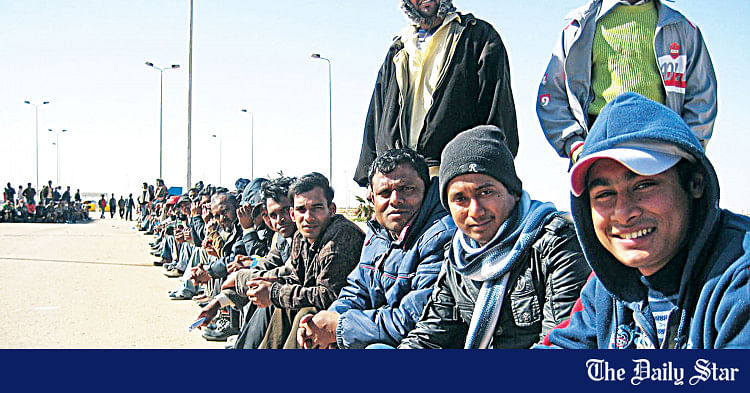In recent years, the diaspora community has emerged as a pivotal force in shaping the economic landscape of Bangladesh, their contributions marked by a blend of remittances, investments, and intellectual exchanges that bolster the country’s march towards sustainable development. With an estimated 13 million Bangladeshis residing abroad, spanning across 162 countries, the diaspora stands as the sixth-largest migrant group globally, their influence echoing across the financial and social spheres of Bangladesh.
History of the Bangladeshi diaspora
The roots of the Bangladeshi diaspora can be traced back to the British Raj, a period where mobility was tightly controlled. Yet, even amidst strict regulations and discriminatory policies, seeds of migration were sown. Notably, lascars from Sylhet, renowned for their seafaring skills, served on British ships, forging connections and establishing small communities in port cities like London and Liverpool. These early pioneers, though limited in number, laid the groundwork for future generations and ignited a spirit of exploration within Bangladeshi communities.
The discovery of oil in the Middle East during the 1970s marked a turning point. With booming economies and an insatiable demand for labour, countries like Saudi Arabia and the United Arab Emirates opened their doors, welcoming eager Bangladeshi workers. This “golden age” of migration witnessed a surge of primarily unskilled and semi-skilled individuals seeking better economic opportunities. Remittances sent back home became a crucial lifeline for the newly independent Bangladesh, fueling its fledgling economy and transforming the lives of countless families.
By the 1980s, migration patterns began to diversify. Skilled professionals, equipped with newfound educational opportunities and driven by aspirations for higher living standards, started setting their sights on Western nations like the UK, the US, and Canada. This period also saw an increase in migration to Southeast Asia, particularly Malaysia and Singapore, where burgeoning economies offered attractive prospects for skilled Bangladeshi workers. The diaspora was no longer a singular phenomenon concentrated in the Middle East; it had blossomed into a multifaceted community spread across the globe.
image generated by: AI Model DALL-E
“>
image generated by: AI Model DALL-E
The diaspora propelling development
As Bangladesh’s economy developed, internal and external migration patterns continued to evolve. While remittance flows remain vital, concerns about “brain drain” have emerged. With skilled professionals increasingly migrating permanently for better career prospects, the potential impact on Bangladesh’s long-term development cannot be ignored.
Development, fundamentally, is propelled by the transfer of knowledge, technology, and investment, where the diaspora communities, with their advantageous global presence, are uniquely positioned to play a decisive role. The experiences of countries like China and India illustrate the transformative impact diaspora engagement can have on a nation’s economic development, leveraging their knowledge, experience, and investments to foster indigenous growth
Remittances from the diaspora have long been the lifeblood of Bangladesh’s economy, providing a crucial source of foreign currency. Despite the global economic turmoil induced by the Covid-19 pandemic and geopolitical tensions, in 2022, the World Bank reported that Bangladesh received a staggering $22.1 billion in remittances, constituting 8.3% of the GDP – a remarkable feat and the highest remittance-to-GDP ratio in South Asia. These inflows directly impact millions of families, improving living standards, financing education, and boosting local economies. Research by the International Organization for Migration (IOM) suggests that 70% of remittance recipients use the funds for essential needs, while a significant portion is invested in agriculture, small businesses, and housing, driving local entrepreneurship and job creation.
This financial infusion has not only elevated the country’s foreign currency reserves past $46 billion but also played a significant role in stabilising the balance of payment and enhancing the nation’s credit rating.
The strategic deployment of these funds ranges from household support to significant investments in the local economy, reshaping the rural and urban economic landscapes alike. The diaspora’s financial contributions have catalysed the growth of various sectors, including agriculture, education, and healthcare, thereby uplifting the standard of living and fostering a more vibrant, inclusive economy.
For instance, my family was part of the 1990s’ second wave of Bangladeshi migration to the UK, originating from Bishwanath in Sylhet. Over the years, they’ve consistently sent remittances back to our village, providing crucial assistance for educational fees, healthcare expenses, and emergency support during the frequent floods in Eastern Bangladesh. This personal experience has deeply influenced my career path too.
The bigger picture
The Bangladeshi diaspora’s impact extends far beyond remittances. With their acquired skills and experience, they act as potential investors, channelling valuable resources into key sectors that bolster the nation’s growth trajectory. The Bangladesh Bank reports that foreign direct investments (FDI) from the diaspora have reached $1.4 billion, supporting crucial modernization initiatives.
For instance, in 2022, diaspora-backed venture capital firm ‘Bangladesh Angels’ invested $1.5 million in a Bangladeshi tech startup developing AI-powered healthcare solutions. Such investments not only inject capital but also bring vital expertise and international connections, propelling innovation and technological advancement. Additionally, diaspora members often possess valuable networks and knowledge of international markets, facilitating trade and promoting Bangladeshi exports. A 2021 study by the World Bank estimates that the diaspora can increase Bangladeshi exports by up to 30% by bridging market information gaps and connecting businesses to international buyers.
The diaspora serves as a bridge between Bangladesh and their adopted countries, promoting cultural exchange and understanding. The “Bangladeshi American Cultural Society” (BACS) organises annual cultural festivals attracting over 10,000 participants, showcasing Bangladeshi heritage and traditions in the US. This is just one example of how the diaspora keeps their cultural flame alive, illuminating understanding and appreciation for Bangladesh on a global stage. Advocacy groups like “Bangladesh Unbound” have successfully lobbied for increased US aid for education and climate change initiatives in Bangladesh. Their voices, amplified by their global reach, raise awareness and advocate for their homeland, leading to tangible improvements in critical areas. A 2023 IOM survey revealed that 75% of diaspora members actively promote Bangladeshi culture in their host countries. This cultural ambassadorship, measured not in statistics but in hearts and minds touched, builds bridges of understanding and fosters a more interconnected world.
Supporting the diaspora
Recognizing the diaspora’s potential, the Bangladeshi government has implemented several initiatives to foster engagement and facilitate their contributions. These include establishing dedicated government bodies like the Bureau of Manpower Employment and Training (BMET), streamlining investment procedures, and organising diaspora conferences like the biennial Global Pravasi Business Sammelan.
The establishment of the “Bangladesh National Diaspora Policy-2023” aims to further harness this potential by creating a structured framework for engagement, promoting investments, and facilitating knowledge and technology transfer from the global Bangladeshi community.
The policy outlines the formation of a diaspora engagement board and the initiation of “Amra Bangladesh” groups at Bangladeshi missions abroad to streamline investment processes and encourage the participation of expatriates in the nation’s development agenda. Through public-private partnerships and strategic networking, the government seeks to attract diaspora investors and entrepreneurs, thereby enhancing the economic capital available for national development.
In the context of remittances, the significance of reliable transfer services cannot be overstated. Companies like Taptap Send play a crucial role in ensuring that the funds sent by the diaspora reach their intended destinations promptly and securely. These services not only support the financial stability of countless families across Bangladesh but also contribute to the country’s economic resilience by facilitating the seamless flow of remittances.
The Bangladeshi diaspora stands as a powerful testament to the human spirit and its capacity to bridge geographical divides. With its vast economic contributions and potential for further engagement, the Bangladeshi diaspora stands as a cornerstone of the nation’s development. By fostering a conducive environment for investment, leveraging the expertise and resources of expatriates, and ensuring efficient mechanisms for remittance transfer, Bangladesh can continue to stride towards a prosperous future. The collective efforts of the diaspora, government, and private sector are pivotal in realising the vision of a developed Bangladesh, where the fruits of economic growth are shared widely and equitably among its people.
Imaad Ahmed, ethnically from Sylhet, helped launch Taptap Send for the Bangladeshi probashi in 2022. It’s now one of the largest app-based FinTech companies for remittances into his home country.




